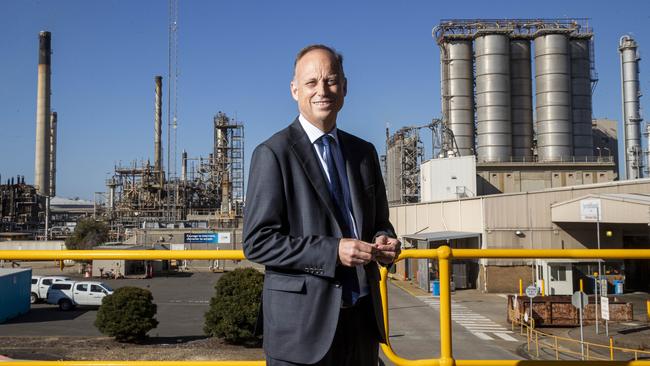Viva Energy triples dividend, spruiks gas imports to curb gap
Fuels retailer Viva has tripled its first-half dividend and said Victoria face a gas supply gap unless its LNG import project proceeds
Fuels retailer Viva Energy tripled its dividend after delivering a jump in first-half earnings while warning a gas supply shortage was likely to remain in place for southern states including Victoria unless its LNG import plant gets the go-ahead.
The company’s Geelong refinery cashed in on strong refining conditions while cautioning margins had slowed in July and August amid weaker economic growth.
Attention is now shifting to Viva’s pipeline of projects including plans for one of Australia’s first LNG import plants, also at Geelong. Viva conceded a final investment decision will likely be delayed from the end of 2022 into early 2023 as it waits the outcome of the Environmental Effects Statement approval process.
However, chief executive Scott Wyatt said energy shortages in Victoria this winter would remain in place until the new source of supply enters the market, potentially in 2024.
“We’ve had a taste of what impacts we can expect as the market goes short over the last couple of months. The market is already showing signs of tightness and the impacts are quite significant in terms of cost,” Mr Wyatt told The Australian.
“So I think that the need is, if anything, more obvious than ever before and the gas situation without an intervention – or a project like ours – will continue to get worse.”
The power grid operator in July warned Victoria’s gas system would remain fragile beyond the end of winter with gas reserves being depleted at a rapid rate. More broadly, the consumer watchdog warned that gas exporters were putting jobs and businesses at risk from massive price hikes and record east coast shortages next year. Labor is weighing up a string of policy measures including using the gas export trigger.
Viva is also among polluters in the crosshairs of Labor’s vow to strengthen its safeguard mechanism.
The operators of 215 large industrial facilities – contributing 28 per cent of Australia’s emissions – have been given one month to respond to Climate Change Minister Chris Bowen’s overhaul of the mechanism, which anchors Labor’s 2030 pledge to cut emissions by 43 per cent.
Experts have argued the policy faces a challenge to determine the treatment for emissions-intensive and trade-exposed industries with broad exemptions potentially undermining climate change goals.
However, the Viva chief said its Geelong refinery met the definition of a trade exposed facility and would look to be treated as such as it works to cut the carbon intensity of its fuels and limit its emissions.
“We come under the emissions intensive trade exposed definition, because we are essentially competing with refineries overseas who may be operating in jurisdictions that aren’t covered by the same requirements that we have in Australia,” Mr Wyatt said. “I think it’s important that our refinery, as much as possible, can compete on a level playing field with those overseas refineries because they do supply about 80 per cent of the fuel that comes into Australia.”
Viva’s underlying group earnings increased by 139 per cent to $612m, just under guidance handed down in July of $614m, with its Geelong refining margin nearly tripling to $US19 ($28) per barrel in the first half of 2022 from the same period a year earlier. Net profit rose 218 per cent to $355m.
Refining earnings soared 747 per cent to $371m while its retail, fuels and marketing earnings rose 14 per cent to $252m.
Viva will pay a dividend of 13.7c a share after deciding to accelerate payment of the refining dividend at 8.8c to reflect the division’s “exceptional earnings” in the first half, a huge jump on last year’s 4.1c payout.
The refining margin bounce was sparked by strong global demand for diesel, tightening supply, reduced China exports and Russian oil sanctions.

Retail fuel volumes were subdued, up just 1 per cent to 2.18 billion litres, due to the pandemic, floods, and high fuel prices. Commercial fuel fared better, with volumes up 7 per cent to 4.6 billion litres as the widespread return of air travel post lockdowns saw demand for jet fuel rise by 13 per cent during the six-month period.
An unplanned outage of its refinery catalytic cracking unit hit production and will reduce the August Geelong refining margin by around $US5 per barrel. The unit is expected to return to service by the end of August.
Refining margins have also softened in July and August amid slower economic growth with the gross refining margin falling to $US15.20 per barrel.
The Geelong refinery supplies half of Victoria’s fuel while Viva has a 1300-strong network of Shell and Liberty service stations around Australia.
It supplies fuel to 50 airports around Australia although demand for jet fuel suffered during the pandemic.
Viva also said the working from home trend may extend into 2023 as some commuters choose to remain cooped-up rather than pay high petrol prices to travel into work.
The Covid-19 pandemic wreaked havoc for fuel retailers and toll road operators as people stayed put. Now with lockdowns a fading memory, Viva said pump price pain was making some households wary of transport costs.
“Another factor which drives people increasingly to work from home rather than come to the office I think is the cost of travel,” Mr Wyatt said. ”High petrol prices is one of the factors that people think about when they decide where they’re going to work.”
Viva said petrol sales in the first half of 2022 were 16 per cent lower than pre-Covid levels in 2019.
Its shares fell 1.1 per cent or 3c to $2.76.




To join the conversation, please log in. Don't have an account? Register
Join the conversation, you are commenting as Logout